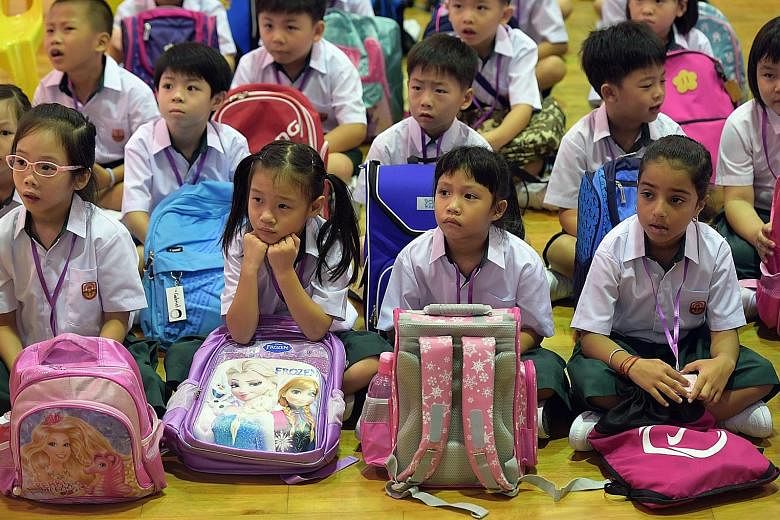Shortly after scrambling to get a place in a primary school, your next concern would be how your child will adjust to Primary 1.
This is a milestone in your child's academic journey, and primary school will be the place he starts to build a foundation in learning and discover interests.
But transitioning from a pre-school environment, where play is the main mode of learning, to a formal classroom setting can be challenging and overwhelming for six-and seven-year-olds.
Early childhood research shows that children develop greater confidence and better social skills if they settle quickly into formal schooling.
Parents often confuse being ready for school with being academically capable in skills such as reading and counting.
Instead of focusing solely on academic progress, it is more important to make learning an enjoyable process, and help your child have a swift and happier adjustment.
Here is a back-to-school guide for parents of new Primary 1 pupils.

TALK TO YOUR CHILD
Share your own experiences of school life and what you enjoyed about it - recess, making new friends, learning a sport or even taking the school bus.
Tell your child about your favourite teachers and subjects. These conversations can help him look forward to a new experience of schooling instead of dreading it.
Encourage him to talk about his feelings about changes that he will be facing and concerns that he might have about going to school. For instance, he will be making new friends and be apart from his old friends from pre-school.
You could also start by visiting the school website and getting your child interested in the facilities and activities it offers.
FAMILIARISE YOUR CHILD WITH THE NEW SCHOOL ENVIRONMENT
The sheer size of a primary school compound and the number of pupils across six levels can be intimidating for Primary 1 pupils.
Orientation programmes, which schools hold before the term starts, are a good way to begin to help your child feel more at ease.
During these sessions, schools conduct tours and briefings for parents and children on what to expect.
Besides getting a glimpse of the school environment, your child could even meet future classmates.
If possible, walk around the school campus and familiarise your child with important areas such as the car or school bus drop-off points, the canteen, general office, classrooms and toilets.
INTRODUCE BASIC SCHOOL RULES
There are many rules in school to follow - help your child understand some basic procedures so that it would not be an overload in his first week of school.
These include classroom routines such as raising the hand to ask questions, taking turns during group activities, or asking for permission to visit the toilet.
He will feel more at ease if he knows, ahead of time, what to expect from the school environment and teachers.
DEVELOP A ROUTINE AT HOME
The typical school day begins at 7am and lasts till midday. Your child will need to have sufficient sleep and rest, get used to waking up early to catch the school bus or walk to school.
Try to help him adjust by introducing a routine a month or so before the start of school. Help him to go to bed early and wake up early, and not get too overwhelmed with the new routine.
At home, you could also help him adjust to a regular schedule, similar to the school timetable. For instance, plan time for lunch, snacks, craft, homework, rest and play.
He will also be spending longer periods of activity in primary school - help him to improve his attention span by using tasks and slowly extending the duration of each activity.
HELP YOUR CHILD LEARN TO BE INDEPENDENT
Primary school will likely be the first time your child will need to carry out tasks on his own - from ordering food and counting change to clearing his own food tray.
Let him be responsible for his own belongings - school bag, stationery, worksheets, books - and make packing bags a habit by helping him think through the items he needs the next day.
Teach him small steps of independence, such as buying food on his own and dealing with canteen queues, managing pocket money, filing worksheets and being organised even at home.
KEEP AN OPEN MIND
Lastly, parents need to manage their own expectations and emotions first, so they do not put too much pressure on their children.
Children are often sensitive to their parents' feelings and actions, so it is important to not get overly anxious about the new school year.
The next six years of schooling and beyond will be a time of learning new things, so remind your child that he might even learn best from going through challenges and problems.


